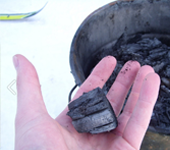Biochar’ is charcoal used for particular purposes, especially as an addition to the soil to enhance its fertility. It can hold carbon in the soil for hundreds and even thousands of years. As biochar improves soil fertility and stimulates plant growth, more CO2 is consumed in a feedback effect. And the energy generated as part of biochar production can displace carbonpositive energy from fossil fuels. Additional effects can further reduce greenhouse gas emissions and enhance carbon storage in soil.
A surge of enthusiasm around biochar’s potential has attracted much commercial interest. However, the idea of large-scale biochar production has come under criticism by many, who accuse such enterprises of “destroying the biosphere in order to save it.”
In his recent book on biochar ’Biocharculture – for Environment and Development’ (MetaMeta Publication), Dr. Sai Bhaskar Reddy (GEO India) emphasizes that viewing biochar as a magic substance that can be applied to soil to reverse climate change would be a mistake. But letting its potential underutilized would be a missed opportunity as well. The optimal function of biochar is as part of a broader culture of sustainability. This leads to the idea of ‘Biocharculture’— a holistic approach, a form of relationship with nature based on the application of biochar in the management of soil, livestock, biomass energy, water purification, sanitation, etc.
In this webinar, Dr Reddy will discusses these ideas in context of his experiences working with rural communities in India as an entrepreneur and development consultant.
More info: http://www.saibhaskar.com/
Produced by: TheWaterChannel
Year: 2014
Language: English
Region: Global

